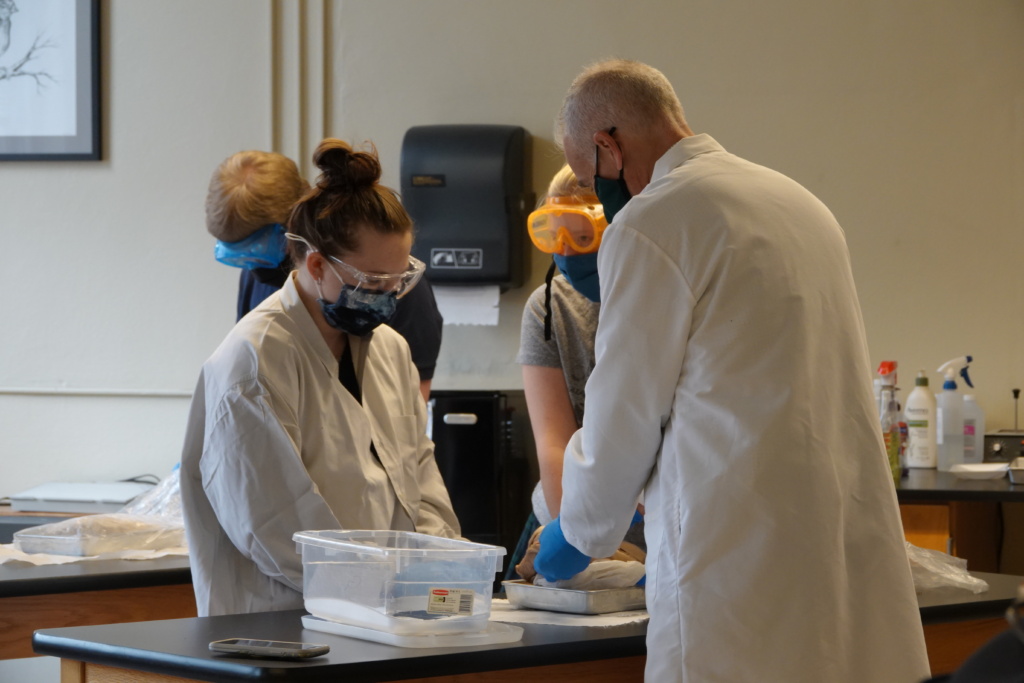We just completed our Upper School Course Guide and couldn’t be more excited to share it with our Doane Stuart families. Here’s just a sneak peek of some of our course offerings!
![]()
The act of going on a journey is one of the fundamental experiences of human life and the subject of nearly every literary genre. The journey is a common metaphor for an individual’s life, and for freedom. Readings include Jack Kerouac’s On the Road, and Rebecca Solnit’s A Field Guide to Getting Lost. Socratic discussions organized around the themes of self, culture, history, writing, and travel are a weekly event. We take a philosophical approach as we consider what is gained from the experience of a journey, and explore how the experience of the journey is, in many ways, more important than the final destination. The course emphasizes critical thinking, literary analysis, student-driven inquiry, and traditional skill-building through the lens of essential questioning.
![]()
Who are we as a society? What do we aspire to be, and what are we afraid of becoming? Why are we increasingly drawn to books and films based on fear, loss, and the will to survive against the odds? In this course, the dystopian narrative creates an alternative reality that we explore through critical analysis of text and film. We then take the ideas we’ve gathered and consider them within the context of our own reality. Students write analytically and creatively throughout the semester culminating in a final group project. The course emphasizes student-driven inquiry and traditional skill-building through the lens of essential questioning. In addition to reading several dystopian novels, we also watch films in the genre such as The Matrix, Ready Player One, and Blade Runner.

By focusing on the turbulent 1960s and early 1970s, this seminar course introduces students to important cultural, economic, political, and social issues of modern America. Students analyze key leaders, and global conflicts including American involvement in Vietnam, independence movements, the Civil and Human Rights movements, popular culture, and the tribulations of 1968. Students examine an array of literary, video, and online sources to reach a critical understanding of the issues of the time and how these conflicts set the stage for 21st century America. In-class assessments include role-playing simulations, debates, and group discussions. Other assessments include projects, journaling, and presentations.
 This is a seminar-style course in which we read and discuss primary scientific literature in the fields of cell and molecular biology. Students are required to participate in classroom discussions as we work our way through three research papers in the first semester. For each research paper, we have an extensive discussion of background and significance prior to examining the research techniques, data, and interpretation of the research presented. During the second semester, each student selects a recent article of interest and develops a class presentation similar in structure to the presentations modeled during the first semester. To round out the year, students select another research article and prepare a much shorter “News and Views” style report in which they interpret and consolidate all information and data with a focus on the most significant piece of data upon which the interpretation rests.
This is a seminar-style course in which we read and discuss primary scientific literature in the fields of cell and molecular biology. Students are required to participate in classroom discussions as we work our way through three research papers in the first semester. For each research paper, we have an extensive discussion of background and significance prior to examining the research techniques, data, and interpretation of the research presented. During the second semester, each student selects a recent article of interest and develops a class presentation similar in structure to the presentations modeled during the first semester. To round out the year, students select another research article and prepare a much shorter “News and Views” style report in which they interpret and consolidate all information and data with a focus on the most significant piece of data upon which the interpretation rests.
![]()
This course is an introduction to psychology. Using a contemporary definition of psychology, which is the science of behavior and mind, this course provides a foundation for the ways psychology approaches basic questions about how and why we behave the way we do. We consider how our understanding of the biology of the brain (neuroscience) has an impact on psychology. This comes under the field of cognitive psychology, sometimes called psychobiology, but we focus on a subfield within cognitive psychology that attempts to identify the biological correlates (molecular mechanisms) of cognition and how these relate to abnormal behavior being labeled as “brain disease.” The implications are discussed from a treatment perspective as well as a legal and societal perspective.
Want to see the full course offerings for our upper school? Click here!

